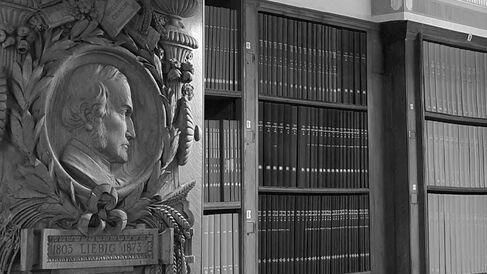Establishing the Library

The Department of Biochemistry Library was first established in 1914, just two years after the Department was constituted. Financed by a grant of £200 from the UK Board of Education, "a small but very useful library" was formed (Annual Report, 1916-1917). Despite several donations from individuals, however, money was short and for the first few years the Library struggled to survive.
In April 1924, as the Department prepared to move into its own purpose-built building (the Sir William Dunn Institute, now known as the Hopkins Building), Sir Jeremiah Colman and the Dunn Trustees provided £2,000 for "a Library for the School of Biochemistry." Of the £2,000, £500 was to be used "in the purchase of the existing library books" and the balance invested in Trustee Securities, the income from which was for "the maintenance of the Library in perpetuity, the provision of scientific journals and their binding, or for any incidental requirement in the upkeep of the Library"(Reporter, 1923-1924).
By way of decoration for the new building, it gave Frederick Gowland Hopkins great pleasure to commission a set of wooden carvings for the main columns of the Library Reading Room. These carvings pay homage to four of Hopkins' scientific heroes:
- John Mayow FRS (1641-1679): a physician, chemist and physiologist who conducted research into respiration and the nature of air.
- Thomas Graham FRS (1805-1869): the Scottish chemist who pioneered the study of dialysis and the diffusion of gases. He coined the term colloid, and separated colloids and crystalloids using technology that was a forerunner to modern kidney dialysis machines.
- Louis Pasteur (1822-1895): the French chemist and microbiologist who discovered the principles of vaccination, microbial fermentation and pasteurisation. Considered one of the main founders of bacteriology, alongside Ferdinand Cohn and Robert Koch, Pasteur has been called the 'Father of Microbiology'. In recognition of Pasteur's discovery of molecular chirality, his carving includes dissymmetric crystals.
- Justus Freiherr von Liebig (1803-1873): the German chemist who is considered the founder of organic chemistry. He has been described as the 'Father of the Fertiliser Industry' for his work on nitrogen and essential plant nutrients. This carving includes sheaves of corn reflecting von Liebig's interest in agricultural chemistry.
The original Colman Library is still in use today and over the years has expanded to occupy what was once a neighbouring research laboratory.
